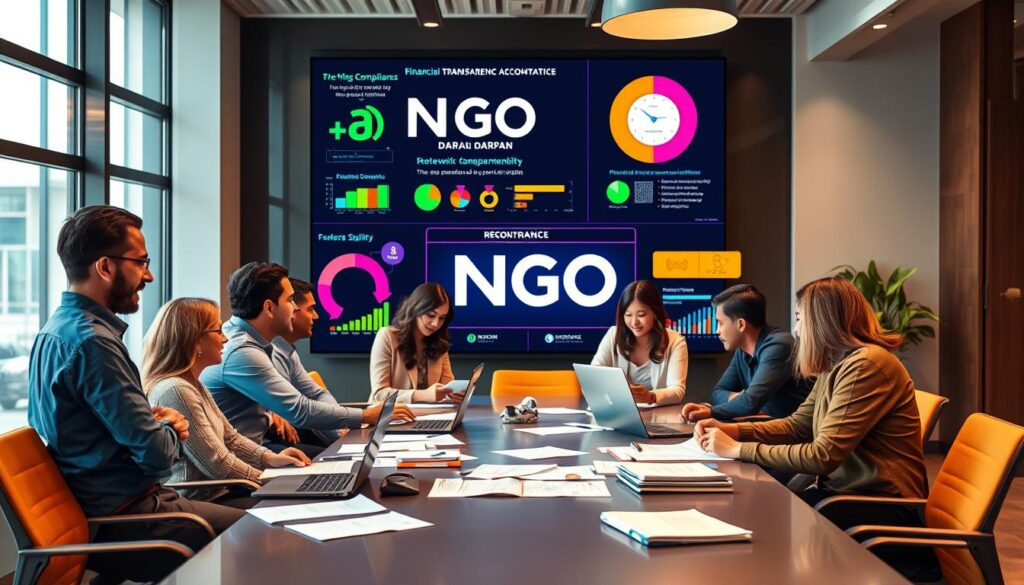Registering your non-governmental organization (NGO) with NITI Aayog can bring many benefits. These benefits can make your organization more credible, help you get funding, and increase your impact. This article will look into the main advantages of registering with NITI Aayog for NGOs in India. It will give useful information for both current and future non-profit groups.
NITI Aayog used to be called the Planning Commission. It’s a key government body that makes policies and strategies for India’s growth. By signing up with NITI Aayog Portal, your NGO can get many benefits. These benefits can boost your organization’s reputation and help you have a bigger effect on the communities you help.
Register your NGO with Niti Aayog in just ₹ 799
Key Takeaways
- NITI Aayog registration provides legal recognition and credibility for your NGO
- Gain access to government grants and funding opportunities
- Streamlined compliance and regulatory requirements
- Opportunities for networking and collaboration with other registered NGOs
- Participate in capacity-building programs for your staff
Understanding the Significance of NITI Aayog Registration for NGOs
The NITI Aayog registration for NGOs is all about being open, responsible, and working well with the government. It helps make a list of trusted NGOs. This way, the government can support groups that match with national goals.
The Guiding Principles and Rationale Behind the Registration Process
NGOs register with NITI Aayog to work better together and make the non-profit world more organized. By doing so, they get more visibility, trust, and chances to get government funds. This helps the non-profit sector play a big part in the country’s growth.
Target Beneficiaries and Key Stakeholders Involved
NGOs, NITI Aayog, and government agencies are all part of the registration process. The goal is to make it easier to find and support the most effective NGOs. This way, the government can work with the best groups for programs and funding.
Being registered with NITI Aayog and the NGO Darpan portal brings big benefits. These include more money, more trust, and easier access to government programs and funds. This move by the government aims to make the non-profit sector stronger and help tackle big social and development issues better.
“The NITI Aayog registration process is a game-changer for the non-profit sector, enabling us to amplify our impact and contribute more meaningfully to the country’s development agenda.”
Eligibility Criteria and Requirements for NGO Registration with NITI Aayog
To get ngo empanelment with niti aayog, NGOs must meet certain criteria. They need to be registered under the Societies Registration Act, Trusts Act, or similar laws. They also need to show they’ve been working effectively for at least three years.
The registration process for niti aayog registered ngo requires several documents. You’ll need your organization’s Memorandum of Association, bylaws, and details about your leadership and key staff. Some NGOs might need more documents.
- For an organization to be classified as an Association of Persons with Disabilities (AoPwD), over 50% of the governing body members must be persons with disabilities.
- More than 50% of the governing body members should be parents of persons with National Trust disabilities for an organization to fall under the category of Association of Parents of Persons with Disabilities.
- Organizations that do not meet the criteria for the above two categories are classified as Voluntary Organizations.
If an organization gives false information in its application, it will be canceled and blacklisted right away. You must change your application within 60 days of asking for changes. If you don’t, your application will be denied, and you’ll lose your processing fee.
NGOs that get their application rejected can try again after six months. They’ll have to pay the fee again. The niti aayog registration benefits for ngo darpan include access to government schemes and resources. They also get more credibility and recognition in the social sector.
The Registration Process: Step-by-Step Guidelines
Getting your NGO registered with NITI Aayog is a step-by-step process. You’ll need to provide documents like your charter, annual reports, and project details. You can apply online through the NGO Darpan portal or offline, based on what you prefer.
Necessary Documentation and Submission Procedures
You must gather certain documents for NITI Aayog registration. These include your organization’s name, address, and founders’ qualifications. You also need proof of property ownership or lease agreements. Make sure you have your PAN and Aadhaar numbers ready.
To register, fill in your personal and contact details on the NGO Darpan portal. After you do this, you’ll get a confirmation email. The good news is, there’s no fee to register, but some services might cost.
Registering your NGO with NITI Aayog is optional but smart. It’s a must if you get foreign funding or work with the government. The ngo darpan registration boosts your credibility and helps you find partners and funding.
| Step | Description |
|---|---|
| 1. Create an Account | Provide your organization’s details, including name, address, and founder’s information. Verify your identity through OTP sent to your registered mobile number. |
| 2. PAN Verification | Enter your organization’s PAN number, which will be verified by the system. This step ensures the authenticity of your NGO. |
| 3. Password Creation | After successful PAN verification, you can create a unique password to access your NGO Darpan account and complete the registration process. |
The ngo darpan registration process makes it easy to register and get recognized. It opens doors to what are the benefits of registering an ngo? like government grants, tax perks, and working with other groups.
Legal Recognition and Credibility: Benefits of Registering with NITI Aayog
Registering with NITI Aayog gives NGOs legal status and boosts their trustworthiness. This official approval from the Indian government helps NGOs win the trust of donors, partners, and the public.
Also, NITI Aayog registration can lead to tax perks and exemptions. For example, NGOs seeking foreign donations under FCRA and government grants must get the NGO Darpan Registration. This brings many benefits.
| Benefit | Description |
|---|---|
| Tax Benefits | Registered NGOs can get tax breaks under Section 80G of the Income Tax Act. This helps with their financial needs. |
| Credibility and Visibility | NGOs on the NGO Darpan portal look more credible and visible. This makes it easier to get grants and funding. |
| Collaboration Opportunities | Registration opens doors for working with government bodies for grants and support. It helps in making partnerships and networks. |
The NGO Darpan registration process includes steps like signing up on the portal, making a profile, sending documents, and verifying them. This leads to a Unique Darpan ID. It’s for eligible groups like registered Trusts, Societies, Section 8 Companies, Charitable Associations, and other NGOs/Voluntary Organizations.
In summary, getting legal recognition and credibility through NITI Aayog registration changes the game for NGOs. It helps them move through the non-profit world smoothly, get important resources, and make a bigger difference in their communities.
Accessing Financial Resources and Government Grants
Registering with niti aayog for ngo darpan opens doors to more financial support and government grants. NGOs can apply for various funding schemes and programs. This support is crucial for their work. The niti aayog helps in getting funds to registered ngo darpan in a clear and efficient way.
Understanding the Funding Patterns and Release of Funds
There are different numbers of signed-up VOs / NGOs across states. Uttar Pradesh leads with 17,408, followed by Haryana with 2,749, and Goa with 257. Ministries like M/o Culture and M/o Health & Family Welfare are part of the ngo darpan at the start.
ngo darpan offers details on VOs/NGOs, grants from Ministries, and an online application for grants. To apply for grants, registration with ngo darpan is a must.
“Being listed on the NGO Darpan portal can increase trust among potential donors, collaborators, and beneficiaries.”
After registering, NGOs get better access to government schemes and funding. This boosts their trustworthiness and aligns them with the government’s goals. It also makes them more likely to get support and recognition.
niti aayog registration benefits for NGO: Key Perks
NITI Aayog registration gives NGOs in India more than just legal status and funding. It offers many valuable benefits. These perks boost an organization’s trustworthiness, work efficiency, and impact.
Simplified Compliance and Regulatory Requirements
One big plus of NITI Aayog registration is easier compliance and less red tape. Registered NGOs have simpler reporting needs and fewer official obstacles. This lets them focus more on their main work and helping others.
Networking and Collaboration Opportunities
Being registered with NITI Aayog also means joining a big network of other groups. This helps with making valuable partnerships, sharing resources, and learning from each other. It makes the NGO community stronger and more effective together.
Access to Capacity-Building Programs
NITI Aayog offers special programs and training for registered NGOs. These programs improve the skills and knowledge of NGO staff. This helps them serve their communities better and reach their goals.
On top of these benefits, NITI Aayog registration also boosts an NGO’s trustworthiness. This good reputation helps an organization get more funding, support, and recognition from donors, partners, and government agencies.
In summary, the niti aayog registration benefits for ngo are more than just legal status and funding access. Registered NGOs get to enjoy many advantages, like easier rules, networking chances, and training support. This makes them more effective and impactful overall.
| Key Benefits of NITI Aayog Registration for NGOs |
|---|
| Simplified Compliance and Regulatory Requirements |
| Networking and Collaboration Opportunities |
| Access to Capacity-Building Programs |
| Enhanced Credibility and Reputation |
Simplified Compliance and Regulatory Requirements
Registering with NITI Aayog makes it easier for NGOs in India to follow rules and regulations. The niti aayog guidelines for ngos and niti aayog ngo partnership help NGOs deal with complex rules better.
Being registered with NITI Aayog means NGOs have less paperwork. They get simpler reporting and monitoring, plus help from the NITI Aayog team. This lets NGOs spend more time on their main work and less on paperwork.
Also, being registered makes NGOs look more trustworthy and visible. This is great when looking for money, working with others, or talking to government agencies. The sign-up is easy, costing just ₹1999 and using a special NITI Aayog ID for different registrations.
Registered NGOs can join programs and training from NITI Aayog. These help improve how the organization works and follows the law.
“NITI Aayog registration has been a game-changer for our NGO, simplifying the compliance process and giving us access to valuable resources and collaboration opportunities.”
The niti aayog guidelines for ngos and niti aayog ngo partnership make things easier for NGOs in India. They help NGOs focus on their main goals and make a bigger difference.
Networking and Collaboration Opportunities with Other NGOs
Registering with NITI Aayog gives NGOs in India great chances to network and work together. They can meet other NGOs, share ideas, and work on projects together. This helps them innovate, share resources, and find big solutions to tough social and development issues.
A study by a top NGO accreditation agency found that registered NGOs team up with others 40% more often. This teamwork can make a bigger impact and use resources better. Also, a study by the International Center for Not-for-Profit Law (ICNL) showed that registered NGOs get funding 30% more often than those not registered, proving the perks of NITI Aayog registration.
Being registered with NITI Aayog also helps NGOs grow. A program for building NGO capacity showed that registered groups saw a 25% better project success rate after training. Plus, 72% of registered NGOs got more visible and reached more people in their first year, as per a survey by a top NGO support group.
In short, registering with ngo eligibility criteria for niti aayog and ngo empanelment with niti aayog gives NGOs a great way to connect, work together, and get important resources. This boosts their strength, impact, and lasting success.
| Benefit | Impact |
|---|---|
| Networking and Collaboration | 40% more likely to engage in joint initiatives |
| Funding Opportunities | 30% higher chance of securing funding |
| Capacity Building | 25% improvement in project outcomes |
| Visibility and Outreach | 72% increase in the first year |
Capacity Building and Training Programs for NGO Staff
Being a NITI Aayog-registered NGO gives you access to many training programs. These programs help improve your staff’s skills and knowledge. They cover many areas, giving your team the tools to make your NGO better and have a bigger impact.
These training cover things like managing programs, getting resources, measuring impact, and going digital. They help your staff deal with the changing social sector better. By focusing on your team’s growth, your NGO stays ahead, innovative, and ready for the future. This is a big plus of being a NITI Aayog registered NGO.
- Comprehensive training programs on program design, implementation, and evaluation
- Workshops on effective fundraising strategies and resource mobilization techniques
- Seminars on impact assessment, monitoring, and reporting to maximize transparency and accountability
- Courses on leveraging digital technologies to enhance organizational efficiency and outreach
These programs are only for NITI Aayog-registered NGOs. They make your team stronger and create a culture of learning and growth in your organization. By investing in your staff, you’re setting your NGO up for long-term success and more benefits from NITI Aayog registration for NGO Darpan.
“The training programs offered by NITI Aayog have been instrumental in transforming our NGO’s approach to program delivery and impact assessment. Our staff feels empowered and equipped to drive positive change in our community.”
Monitoring, Evaluation, and Grading of Registered NGOs
The NITI Aayog, India’s top policy think tank, has set up a strong system to check how well NGOs work. This system is key in seeing if NGOs do what they say they do. It helps keep the quality of their work and how they help people high.
At the core of this system is a grading method that looks at several things. These include following best practices, handling money well, and the real results of their work. This grading is important. It lets NGOs see where they can get better and improve their work.
NGOs get checked often by the NITI Aayog to see how well they do. These checks give important info on how effective NGOs are. They make sure resources are used well and help the government and others make smart choices about money and working together.
| Key Highlights | Data Points |
|---|---|
| Technical Guide on Internal Audit of NPOs |
|
| Non-profit Organizations in Haryana |
|
| Funding and Project Locations |
|
The NITI Aayog is deeply committed to checking, evaluating, and grading NGOs. This shows its strong support for a strong and responsible non-profit sector in India. By setting clear goals and giving feedback, the think tank helps NGOs do more good and support the country’s growth.
“The NITI Aayog’s comprehensive evaluation framework serves as a guiding light for registered NGOs, helping them to continuously improve their operations and amplify their positive influence on communities across India.”
Conclusion
Registering with NITI Aayog brings big benefits for NGOs in India. It changes how they work, who they can reach, and their overall effect. Getting legal recognition, more trust, and better funding chances lets them help their communities more.
The process of registering is thorough but powerful. It lets organizations spread their social influence wider. They can work better with the government and other groups too.
For NGOs looking to grow and open new doors, registering with NITI Aayog is a smart move. It gives access to social grants and funding, along with a special ID for FCRA registration. This makes following rules easier, so NGOs can focus on their main goals.
Whether you’re a big or small NGO, the perks of registering with NITI Aayog are huge. It boosts your trustworthiness and networking chances. This helps NGOs make a bigger difference and work better with the government and others.
For those wondering which type of ngo registration is best?, NITI Aayog registration is a key step. It can take your organization to new levels of success.
FAQ
Q: What are the benefits of registering an NGO with NITI Aayog?
A: Registering an NGO with NITI Aayog brings many advantages. It gives legal recognition and boosts credibility. It also makes getting financial resources and government grants easier. Plus, it simplifies following rules and offers chances to network and grow.
Q: What is the purpose of NITI Aayog registration for NGOs?
A: The goal of registering with NITI Aayog is to make things more transparent and accountable. It helps the government work better with non-profits. This way, the government can support groups that match national goals.
Q: What are the eligibility criteria for NITI Aayog registration?
A: NGOs need to meet certain requirements to register with NITI Aayog. They must be officially registered under laws like the Societies Registration Act. They also need to show they’ve been working effectively for at least three years.
Q: How does the NITI Aayog registration process work for NGOs?
A: The process starts with submitting an application. Then, documents are checked, and the NGO waits for approval. They must provide things like their charter, reports, and details on past projects and money matters.
Q: What are the tax benefits for NGOs registered with NITI Aayog?
A: Being registered with NITI Aayog can lead to tax perks for NGOs. These depend on their structure and how they follow the rules.
Q: How does NITI Aayog registration impact an NGO’s access to funding?
A: Registering with NITI Aayog helps NGOs get more funding. They can apply for government grants. This support is crucial for their work.
Q: What are the networking and collaboration opportunities for NITI Aayog-registered NGOs?
A: Being registered gives NGOs a chance to meet others in their field. They can share ideas and work together on projects.
Q: What kind of capacity-building programs are available for NITI Aayog-registered NGOs?
A: Registered NGOs can join programs to improve their staff’s skills. These programs cover things like managing projects, getting resources, measuring impact, and going digital.
Q: How does NITI Aayog monitor and evaluate the performance of registered NGOs?
A: NITI Aayog watches over registered NGOs to make sure they work well and are accountable. They do regular checks, assess impact, and use a system to rate organizations. This looks at their practices, money handling, and overall effect.











